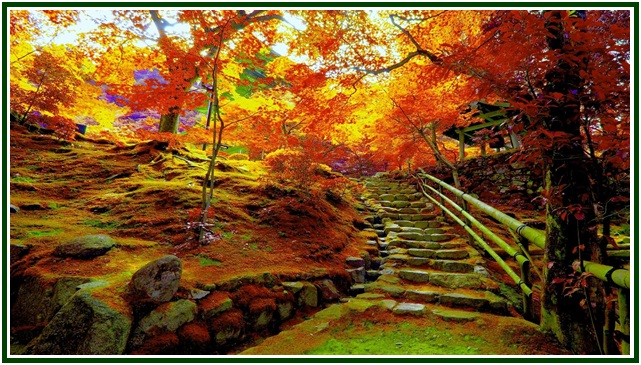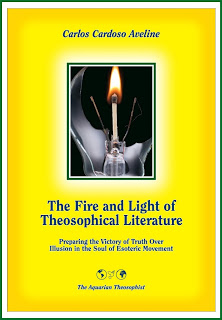
Observing the Sacredness of Daily Life
Carlos Cardoso Aveline

* Detachment and wisdom come from a long-term view of time.
* Right contemplation paves the way to effective action.
* Daily moments of silence and quietness are essential to the strengthening of one’s inner peace.
* A thorough understanding of life produces detachment and leads one to higher levels of perception.
* An open mind must examine facts from various points of view before making a decision.
* Keeping one’s inner peace in daily life is an act of will and requires a firm decision.
* The world of the soul has its own atmosphere. In it, only the selfless heart and mind can see with clarity.
* Think the best, do the best, and never cease to listen to the most beautiful voice anyone can hear: the voice of the silence.
* We are co-responsible for whatever will come to us. The correct way to live the present moment includes taking into consideration the long-term future and accepting that we are its co-creators.
* It is not enough to develop a universal view of the world. One must bring transcendence into daily existence and gradually liberate human life from attachment to ignorance.
* By keeping in mind the most elevated in ourselves, we attain an accurate sense of direction. Time and energy are used correctly as long as we maintain a wordless contact with our true sources of inspiration.
* We must start by adopting an ideal that is noble and challenging enough to liberate us from organized mediocrity or spiritual death. We then have to struggle with the painful distance between noble intentions and clumsy actions. It is wise to accept a gradual progress. One should not be deceived by difficulties that present themselves as insurmountable.
* Do your best and don’t worry about short term results. The working of the Law cannot be hurried up. Springtime, or a new day, will not come sooner just because someone is personally anxious.
* The mind works in multidimensional unity with the heart. No divorce is possible between them, except on a superficial level. However, their cooperation can always be improved, by knowledge and by wisdom.
* Compassion means “co-feeling”; feeling together; feeling the same as the other. It is the ultimate origin of solidary actions. One who has compassion sees human suffering, understands its causes and still preserves peace in his heart, because he knows of much larger cycles of Karma or space-time, where bliss is correctly seen as the ultimate Law of life.
* An effective way to help the world attain peace is to live in peace yourself under whatever circumstances. The world around will then silently learn from you. But remember: peace is no paralysis. Living peace implies being active, creative, humble, and at times severe.
* “Good” is not the same as “comfortable”, as Musonius Rufus and every authentic sage clarify. And “bad” is not a synonym to “uncomfortable”. Bliss is challenging. Theosophy cannot be separated from a degree of stoicism, or “tapah” – austerity. The hardest and most unpleasant duty is a source of eternal happiness, as long as one is connected to his own spiritual soul.
* In any time in history, the amount of external peace reflects the level of peace in human hearts. A small number of actively altruistic persons makes a big difference in the collective karma. (See Genesis, 18: 20-33, and Genesis, 19.) Even today, the peace in the heart of those who search for wisdom can effectively avoid the worst aspects of military conflicts and other forms of ignorance.
* There are two ways one can be defeated by deliberate falsity. One of them consists in believing the lies. The other one happens by getting angry. Falsehoods must be dismantled with a firm serenity. The warrior who feels intense anger is defeated. Victory results from a stable, accurate action, and a combination of watchfulness and confidence. The struggle takes place fundamentally within the student’s consciousness: he himself is the battlefield.
* All expression is limited. As we make something become “visible”, we leave aside the unutterable essence. The inner nature of things can only be perceived in unworded silence, on the basis of humble hints given through words and other visible signs.
* The right kind of silence is produced by a complementary harmony among the different viewpoints, once they are at least partially true. Illusion must be destroyed by the good law of karma before one’s heart attains to a lasting glimpse of truth, and the glimpse will be silent.
* Although popular in some “esoteric” circles, the “mystical paralysis of the soul” brought about by quietism is worse than useless. The practice of false or “choiceless” contemplation strengthens spiritual ignorance and expands the lack of ethics. Every student of theosophy must test his spiritual will in altruistic action. One needs to observe the practical results of his actions, identify the lessons to learn, and try again from a long-term perspective.
* There is no reason to be too naïve: let’s not deceive ourselves, if we see an apparently solid wall blocking our path ahead and upwards. When we look at difficulties from the right angle, they open the magic door to transmutation. The fire of probation gradually provokes the alchemy of spiritual soul. Such an inner revolution transforms the dense karma of ignorance in the plastic and creative karma of that learning which takes place in the direction of light.
000
An initial version of the above fragments was published anonymously in the March 2015 edition of “The Aquarian Theosophist”.
000
On the role of the esoteric movement in the ethical awakening of mankind during the 21st century, see the book “The Fire and Light of Theosophical Literature”, by Carlos Cardoso Aveline.

Published in 2013 by The Aquarian Theosophist, the volume has 255 pages and can be obtained through Amazon Books.
000